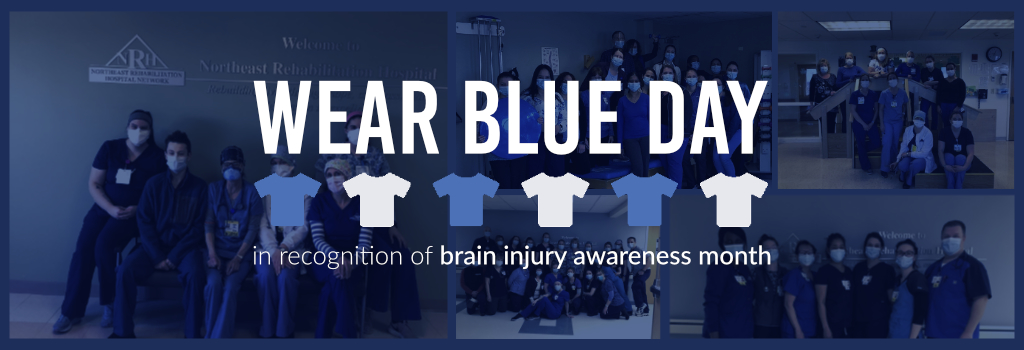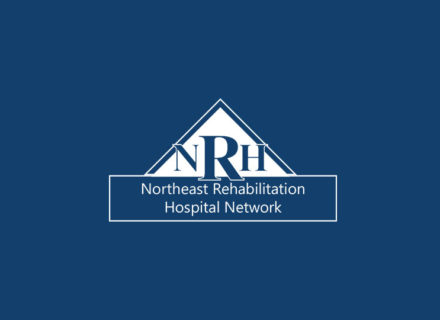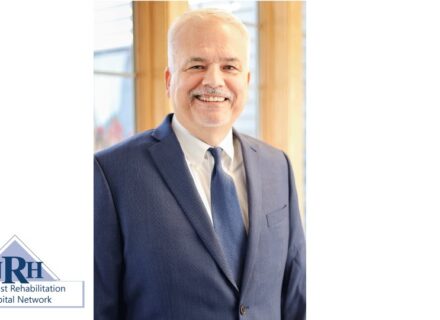Northeast Rehabilitation Hospital Joins the Nation in Raising Awareness about Brain Injury

Wear Blue Day is a tradition that Northeast Rehabilitation Hospital Network employees have honored for years. Teams across Northeast Rehab’s acute inpatient rehabilitation hospitals and outpatient therapy locations recently dressed in blue to honor the 5.3 million Americans living with a brain injury.
Every year Northeast Rehabilitation Hospital Network participates in “Wear Blue Day” to honor the 5.3 million Americans living with a brain injury. Every March, for more than three decades, Brain Injury Awareness Month has been led by the Brain Injury Association of America (BIAA).
“For many, brain injury evolves into a chronic health condition that changes who they are and how they interact with the world,” offered Susan H. Connors, BIAA’s president and chief executive officer. “Raising awareness of the impact of brain injury and making sure people have access to the support they need is essential – not only in March, but throughout the year.”
An acquired brain injury (ABI) is an injury to the brain that is not hereditary, congenital, degenerative or induced by birth trauma. ABIs – from trauma, stroke, infectious diseases and brain tumors – are a serious public health issue in the United States, where someone sustains a brain injury every nine seconds. According to available data, more than 5.3 million Americans live with brain injury-related disabilities at a cost exceeding $76.5 billion (in 2010 dollars) annually.
According to the BIAA, every nine seconds someone in the United States sustains a brain injury. A brain injury can happen anytime, anywhere and to anyone. Brain injuries do not discriminate. An injury that happens in an instant can bring a lifetime of physical, cognitive and behavior challenges and early, equal and adequate access to care will greatly increase overall quality of life.
“Since anyone can sustain a brain injury at any time, it is important for everyone to have access to comprehensive rehabilitation and ongoing disease management,” said Dr. Brent Masel, national medical director for the Brain Injury Association of America. “Doing so eases medical complications, permanent disability, family dysfunction, job loss, homelessness, impoverishment, medical indigence, suicide and involvement with the criminal or juvenile justice system. Access to early, comprehensive treatment for brain injury also alleviates the burden of long term care that is transferred to tax payers at the federal, state and local levels.”
For more than 35 years, Northeast Rehabilitation Hospital Network has been providing highly specialized, evidence-based therapies to individuals affected by unexpected, life-changing health conditions such as brain injuries and strokes.
“We are proud to join advocates across the country to honor the millions of people who have been affected by a brain injury. Our team strongly believes that with high quality, compassionate care individuals affected by a brain injury can redefine their lives and accomplish their goals,” said Dr. Young, Chief Medical Officer at Northeast Rehabilitation Hospital Network. “The story of Mr. Terry is a heartwarming example of how individuals are overcoming their diagnosis, pushing boundaries and looking ahead in life. Mr. Terry’s journey continues to inspire our team.”
While the More Than My Brain Injury campaign provides a platform for educating the public about the incidence of brain injury, its purpose is not bound to Brain Injury Awareness month in March. “Throughout the year, we encourage everyone to take time to learn about brain injuries and find inspiration in the stories shared,” added Dr. Young. “Together, we can de-stigmatize the injury, highlight the diversity of the brain injury community while also empowering those who have survived and will survive.”



